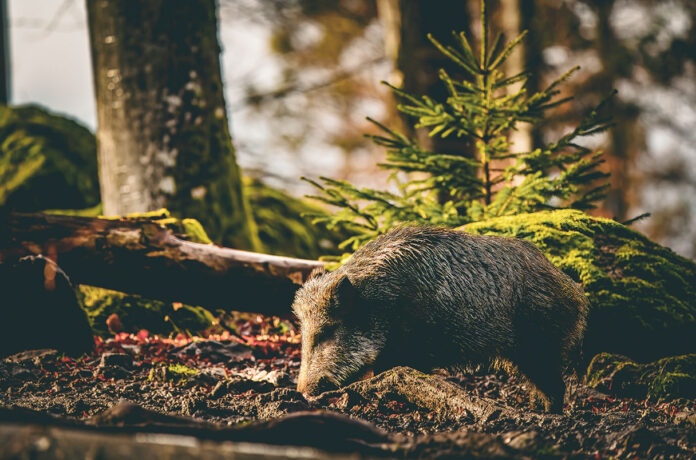What has tusks, bristly hair, and is contaminated with dangerous levels of radiation? Visit Germany’s Bavarian mountain towns and you just may find out. The wild boars (Sus scrofa) that snuffle through the region’s forests are so radioactive that the country has ruled them unsafe to eat—but why these animals are so contaminated has proved a puzzle. In a new study out today in Environmental Science & Technology, scientists report that at least some of the radioactive elements in their bodies are the result of fallout from atomic bombs that detonated in our atmosphere more than 60 years ago.
The environmental and health consequences of nuclear weapons testing have so far been “understudied and largely forgotten,” says James Kaste, a geochemist at the College of William & Mary who was not involved in the study. “This is one of the ultimate case studies showing how legacy soil pollution can haunt generations to come.”
The enduring radioactivity of Bavaria’s boars has traditionally been blamed on the 1986 meltdown of the Chernobyl nuclear power reactor, some 1300 kilometers away. Immediately after the disaster, radioactive fallout spread over the environment, leaving forest animals in Bavaria and elsewhere contaminated with radioactive cesium. Levels of radioactivity in most creatures decreased over the following years—but not so for the Bavarian boars. Scientists believe that’s because of the animals’ penchant for truffle mushrooms. As rainfall slowly carries radioactive particles down through the soil, they accumulate in the tasty fungi, which are eventually rooted up by the hungry boars.
Yet some wondered whether the Chernobyl fallout alone could account for the boars’ intense radioactivity. Bin Feng, a radioecologist at Leibniz University Hannover and the Vienna University of Technology (TU Wien), thought the animals might also be indirect victims of nuclear weapons testing that reached its peak in the 1960s. Of the more than 2000 nuclear bombs detonated worldwide during the Cold War, 500 were blown up in the atmosphere, releasing radioactive particles that then drifted back down to the ground. Those particles are now ubiquitous in soil, says Georg Steinhauser, a radiochemist at TU Wien and another study author.
Feng and colleagues worked with hunters to collect meat from 48 boars around the region, measuring the levels of radioactive cesium from the animals. Consistent with past studies, the team found that 88% of the samples were too radioactive to be eaten under German safety standards.
Next, the researchers looked for telltale isotopic signatures. The researchers were particularly interested in two different forms of cesium—cesium-137 and cesium-135—which are produced at different ratios depending on whether they were borne from a reactor or a nuclear explosion. By comparing the relative masses of these isotopes in their samples, Feng and colleagues could figure out where the cesium originated.
The team found that all the boar meat contained radioactive cesium from both Chernobyl and nuclear weapons fallout. The proportion from nuclear bomb blasts varied between 10% and 99% across samples. That’s “astonishingly high,” Kaste says. In one-quarter of the boars, the radioactivity from the bombs’ fallout alone was enough to make the meat too dangerous to eat.
The slow downward movement of cesium through the forest’s soil likely plays a role in this phenomenon, Steinhauser says. After radioactive particles settle on the ground, the soil holds it in one layer like a time capsule, and rainfall steadily washes it deeper year after year. Over time, the particles accumulate in fungi and make their way into boar, in what Feng calls a “snowball effect.” In winter, Bavarian boars have few other food sources, making them especially vulnerable to accumulating radiation.
Consumption of wild boar meat, which was long considered a delicacy in the region, has noticeably decreased in recent decades, Steinhauser says. There are ecological impacts, too, he adds. If no one wants to eat boar meat, hunters could be deterred from thinning their numbers, raising the possibility that populations could grow unmanageably large. This would threaten Bavarian forests, Steinhauser says, as too many boars can cause a lot of damage to forest vegetation and nearby farms.
Source : Science

